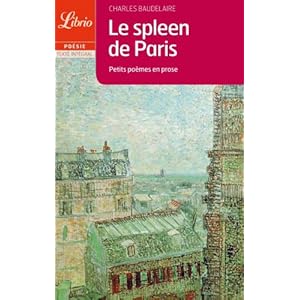--The blurb--
"Set in a modern, urban Paris, the prose pieces in Paris Spleen constitute a further exploration of the terrain Baudelaire had covered in his verse masterpiece, "The Flowers of Evil": the city and its squalor and inequalities, the pressures of time and mortality, and the liberation provided by the sensual delights of intoxication, art and women."
--The review--
Marketed as a series of prose poems - a format which I ordinarily adore - I was looking forward to my first taste of one of France's most famous authors. Split into several relatively short sections, it has readability on its side not only in these terms but also in terms of the fact that funnily enough these "prose poems" did not seem to be especially poetic by the standards of modern day prose poems; to me they just seemed like pieces of very good yet accessible descriptive writing, which in itself was not unenjoyable.
Reading this in the original was a difficult experience due to the at times strange sentence constructions that pervaded it; however, in translations this may have been eradicated. This was exacerbated by the fact that several of the prose poems just weren't that memorable, seeming to repeat the same themes over and over again, particularly stating the theme - still common in France today - that the French, even the upper class ones with the greatest security of money and home, feel duty bound to sympathise with the poor for fear that they could too end up in their position (even when this is not in the least bit likely).
The two segments worth reading, however, are the haunting "The Eyes of the Poor", which most effectively describes the plight of the impoverished, and "The Rope", which is a frankly terrifying tale which has a hint of the Henry James about it. These perhaps most fully exemplify the literary meaning of 'spleen' as used in this collection's title, meaning 'an unexplained melancholy or disgust'. Learning that Edgar Allan Poe was one of Baudelaire's influences comes as no surprise, particularly after reading "The Rope", and it perhaps also fulfils the criterion of there being something for everyone contained within Paris Spleen, as the work spans horror-type stories and morality tales as well as debauchery and beautiful descriptions; in this respect it is not dissimilar to Boccaccio's Decameron - although, of course, in a much shorter and more distilled form.
The Flowers of Evil (1857)
Artificial Paradises (1860)






No comments:
Post a Comment